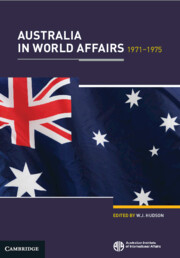Book contents
- Frontmatter
- Contents
- Preface
- I Defence Policy
- 2 Defence Reorganisation 1957–75
- 3 Investment
- 4 Immigration
- 5 International Law
- 6 The United Nations
- 7 The United States
- 8 The United Kingdom
- 9 Japan
- 10 China
- 11 South-East Asia
- 12 The Indian Ocean
- 13 South-West Pacific
- 14 Papua New Guinea
- 15 A Day in The Life of An Ambassador
- Notes
- Index
6 - The United Nations
Published online by Cambridge University Press: 29 March 2024
- Frontmatter
- Contents
- Preface
- I Defence Policy
- 2 Defence Reorganisation 1957–75
- 3 Investment
- 4 Immigration
- 5 International Law
- 6 The United Nations
- 7 The United States
- 8 The United Kingdom
- 9 Japan
- 10 China
- 11 South-East Asia
- 12 The Indian Ocean
- 13 South-West Pacific
- 14 Papua New Guinea
- 15 A Day in The Life of An Ambassador
- Notes
- Index
Summary
In the first half of the 1970s the United Nations was accorded a higher priority in the conduct of Australian foreign policy than it had been given in the 1960s. This was partly a reflection of Labor’s emphasis on United Nations initiatives, but not entirely so. The highlight of the period was Australia’s membership of the United Nations Security Council in 1973–74, during Labor’s term of office. But the decision to seek a seat on the Security Council (after some years of avoiding our turn), and success in winning it, had occurred in 1972 under the Liberal-Country Party Government.
Keywords
- Type
- Chapter
- Information
- Australia in World Affairs 1971–1975 , pp. 126 - 162Publisher: Cambridge University PressFirst published in: 2024

